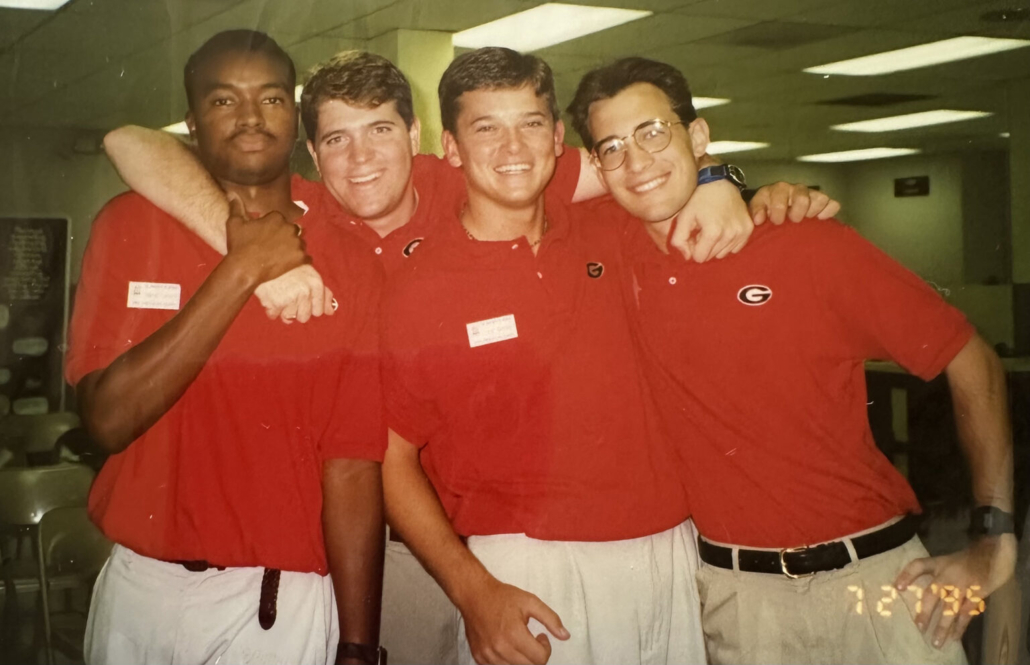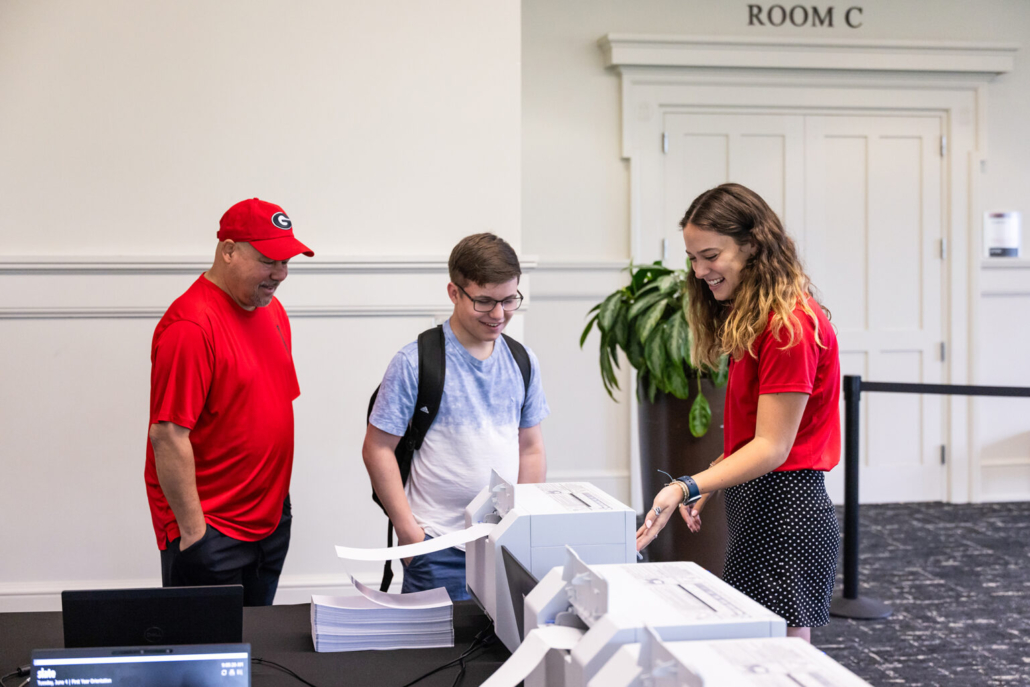Blake Witmer is following in her father’s footsteps
This story, written by Heather Skyler, was originally published on UGA Today on June 14, 2024.
Two UGA Orientation leaders from the same family, 29 years apart.
Every year, approximately 8,000 students and 12,000 family members come to the University of Georgia for Orientation. The job of introducing these groups to campus is a coveted position, and over 100 students apply to be orientation leaders every year. Only 20 are selected.
This summer, rising junior Blake Witmer ’26 earned one of those spots, stepping into the same role her father, Craig Witmer (BSED ’96), had in 1995.

Craig Witmer (second from right) with three of his fellow 1995 orientation leaders. (PHOTO: Chamberlain Smith/UGA)
The new orientation leaders are each assigned a number, and each number has an adjective attached, from “Wild 1” to “Timeless 20.”
“When my dad was here, there were only 10 leaders and there were no adjectives,” Blake explained. “They just sat them down and told them their number. Now it’s a big deal. They even have number reveal day.”

Blake Witmer and her father, Craig Witmer, make a six with their hands beside Herty Fountain. Each of them were number “Saucy Six” as orientation leaders. (PHOTO: Chamberlain Smith/UGA)
Blake was thrilled to discover that she would be “Saucy 6,” the same number her father had. When she found out, she called her dad, who was excited about the connection. Last summer’s number six, Cole Broomberg, was there with her when she made the call.
“Your number from last year becomes your mentor,” she explained. “Cole texts me every day to check in. He’s my number dad. I call him Papa.”
Blake grew up in Grayson. Both of her parents and her older sister attended UGA, and all three of them are teachers. When it came time for Blake to apply to college, she was determined to go somewhere else and “break the cycle.”

Orientation leader Blake Witmer greets freshman students and parents at orientation check in at Tate Grand Hall. (PHOTO: Chamberlain Smith/UGA)
She was considering a small, prestigious college in upstate New York, but after attending the UGA game against Coastal Carolina with her sister, Hayden, who lived on campus at the time, Blake had a change of heart.
“I liked how big campus was. I thought I wanted to go to a smaller school because my high school was big, but once I was here visiting, I liked that aspect. On a tour of UGA, my guide said, ‘You can make a big school small, but you can’t make a small school big.’ I really liked that.”

Craig Witmer (Bottom row, second from left) with the 1995 orientation leaders. (PHOTO: Chamberlain Smith/UGA)
After receiving early admission and the Zell Miller Scholarship, Blake committed to UGA, and she’s been deeply involved in campus life ever since she arrived. During her first year, she joined a student government First-Year Program.
“It really tuned in my love for mentorship. Specifically for the first-year experience, which I think is such a unique time in a college career,” she said, adding that the program helped her learn how to get students excited and involved during their first year of college, which was perfect training for being an OL.
Despite changing her mind about coming to UGA and despite her love of mentoring, she plans to break the family cycle of becoming a teacher. As a public relations major in UGA’s Grady College of Journalism and Mass Communication, she likes the idea of possibly going into publishing. Currently, she works for a local fashion and culture magazine called Strike, writing articles and acting as blog director.

Portrait of Craig Witmer, former orientation leader, and daughter Blake Witmer, current orientation leader, in front of the Arch. (PHOTO: Chamberlain Smith/UGA)
But right now, most of her time involves introducing students to UGA. New student orientation began May 30 and there are 17 first-year sessions before school begins in August. Each group attends two days of orientation, which starts with a silly song and dance number performed by all 20 orientation leaders. Then small groups tour campus, learn about UGA’s social media accounts from the Division of Marketing and Communications, play games, and eat dinner in the dining hall before watching the OLs perform skits. Finally, they spend the evening at Ramsey signing up for student organizations and choosing from activities like a silent disco or board games.
Craig Witmer said a lot has changed about the job since his time at UGA, but he thinks there are more commonalities than differences. “The biggest similarity is the ability to share a love of UGA with so many people,” he said.
Blake said her favorite part of the job is getting to meet the students. “It’s such a fulfilling experience. I can see why people stay in higher ed. There’s nothing like it. Getting to be a part of that for the whole summer is going to be great.”

